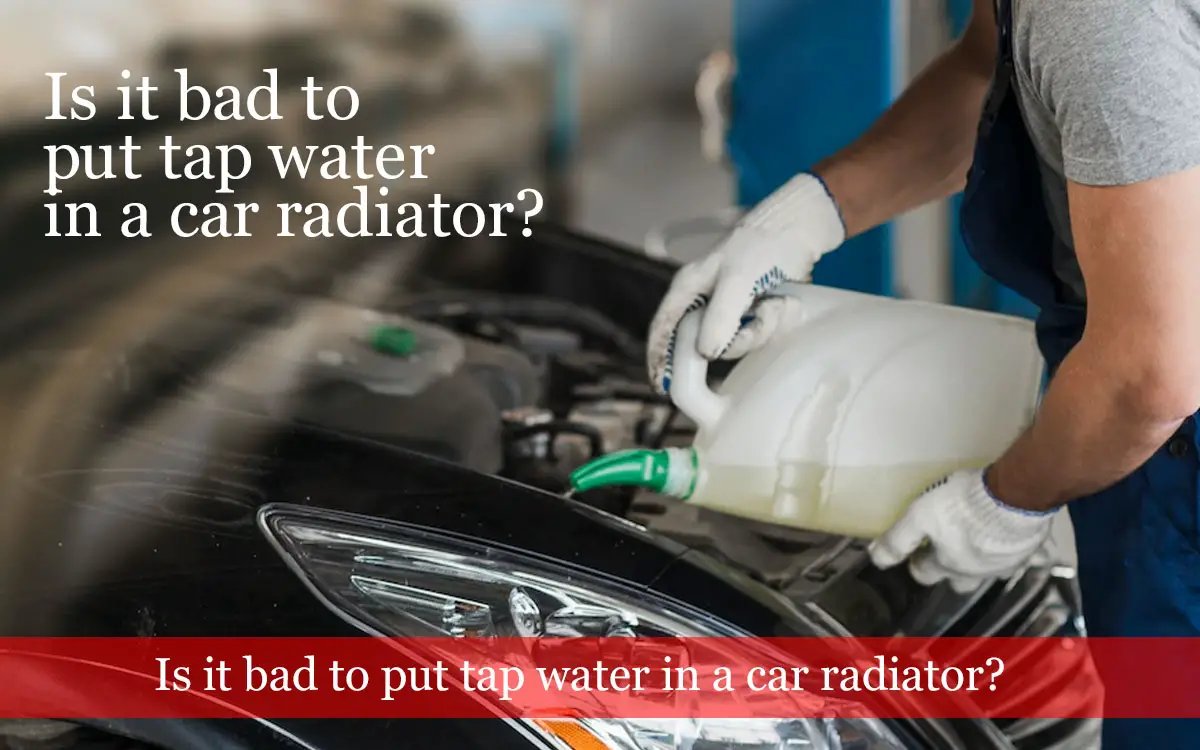As drivers, we often find ourselves faced with the dilemma of what to do when our car’s radiator is running low on coolant. Should we reach for that convenient jug of tap water or spend the extra money on coolant specifically designed for cars?
The age-old debate has divided car enthusiasts and mechanics alike, sparking rumors and urban legends about the supposed damages that tap water can inflict on a car’s radiator. In this comprehensive article, we aim to uncover the truth behind this automotive controversy and shed light on the question:
Is it really bad to put tap water in a car radiator? Brace yourselves for a deep dive into the world of radiators, coolants, and the science behind them all.
To answer the question “Is it bad to put tap water in a car’s radiator?”, I would personally advise against using tap water in a car’s radiator. It can be a tempting idea due to its low cost and accessibility, but it is not without consequences.
Keep reading to find out about the dangers of using tap water in your radiator, and why you should consider investing in the right coolant for your car.
Cons of Using Water in Your Car’s Radiator?
When it comes to cooling a car’s engine, the most important factor is the heat transfer rate. The higher the heat transfer rate of your radiator fluid, the more efficient it will be at cooling. There are a couple of reasons why you shouldn’t use tap water in your car’s radiator, namely:
- Tap water contains minerals
- High pH levels
- Lacks additives
- Hotter operating temperatures
1. Tap Water Contains Minerals
Tap water contains minerals such as magnesium and calcium, that can form scale deposits on the inside of your car’s radiator over time and build up in your car’s radiator, reducing its efficiency. The accumulation of these minerals can also cause blockages and corrosion to occur, leading to expensive repairs down the road. As such, it is best to avoid using tap water in a car’s radiator altogether.
My father had a Jeep Wrangler and mostly topped up with tap water against the advice of his mechanic, little did he know that all these minerals were slowly reducing the lifespan and efficiency of his radiator. Eventually, he had to replace it due to a blockage caused by mineral buildup in the radiator, which could have been prevented if he used the right coolant from the start.
2. High pH Levels
Tap water has an overall higher pH level than most antifreeze/coolants, which can lead to a higher rate of corrosion in your car’s radiator and other engine parts. High levels of pH can cause metal components to corrode at an accelerated rate, leading to clogs and leaks that will require expensive repairs down the road.
In case you don’t know what pH means, It means the potential of Hydrogen and is a measure of the acidity or alkalinity of a solution on a scale from 0 to 14. The lower the pH level, the more acidic it is and vice versa for higher pH levels. So using water in your radiator can cause corrosion to occur faster than if you were using antifreeze/coolant.
3. Tap Water Lacks Additives
Tap water also lacks the additives that coolants/antifreeze contain, such as lubricants and corrosion inhibitors which help your car’s radiator run more efficiently. Without these additives, the metal parts in the radiator will be more prone to damage and overheating, thus leading to costly repairs or even replacement.
It is important to remember that different cars require different types of coolants/antifreeze so make sure you check your car’s manual before purchasing any type of coolant or antifreeze, as using the wrong one can be even more damaging.
The Bottom Line
When it comes to filling up your car’s radiator, tap water should not be used as a substitute for coolant/antifreeze. Tap water has a higher pH level which can lead to corrosion in the radiator and other engine components. Furthermore, tap water does not contain any of the necessary additives that coolants/antifreeze have to make sure your car is running optimally.
Now that we know how bad it is to use water in your radiator let’s take a look at how to maintain your radiator to ensure maximum efficiency and longevity.
Maintaining Your Radiator
To ensure that your radiator is running at its peak performance
- Check hoses and connections for wear or damage
- Check coolant/antifreeze levels regularly
- Flush the radiator system and add fresh coolant/antifreeze when needed
- Replace the radiator cap if it is damaged or sticky
Let’s look at these in detail:
1. Check hoses and connections for wear or damage
To maintain your radiator, you should check your hoses and connections for any wear or damage. The hoses are responsible for carrying the coolant/antifreeze to your radiator. If they are damaged, they can cause a leak, which not only wastes precious coolant/antifreeze but also causes the radiator to overheat and fail.
This can be done by visually inspecting them and feeling around the hoses for any soft spots or friction burns. If you find any signs of wear or damage, it’s best to replace the hose as soon as possible.
2. Check coolant/antifreeze levels regularly
Secondly, It is important to check your car’s coolant/antifreeze levels regularly. This can easily be done with a dipstick. You should look for the manufacturer’s recommendation on how often to check your coolant/antifreeze and add more as needed.
It’s important to use the correct type of coolant/antifreeze for your car. Check your owner’s manual or ask your mechanic for advice.
3. Flush the radiator system and add fresh coolant/antifreeze when needed
If you find that your car is starting to overheat or is running at an unusually high temperature, it may be time to flush out your radiator and add fresh coolant/antifreeze. This will help remove any dirt or debris that has built up in the system as well as add fresh coolant/antifreeze which can help prevent rust and corrosion.
4. Replace the radiator cap if it is damaged or sticky
Finally, you should replace your radiator cap if it is damaged or sticky. A sticky or broken radiator cap can cause a build-up of pressure in the system, which can lead to overheating and potential failure of the entire system. If you’re not sure how to do this, consult your owner’s manual or get help from a qualified mechanic.
By following these simple steps, you can keep your car running smoothly and efficiently for many years to come.
Tap Final Thought
There you have it! Coolant is the best way to keep your car running smoothly and efficiently. Not only does it help prevent engine damage, but it can also save you money in the long run as well. So don’t forget to check your coolant levels regularly and follow the manufacturer’s instructions when adding new coolant/antifreeze to your car!
Happy driving! 🚗
I hope this article has helped you understand the importance of coolant/antifreeze for your car. It’s a relatively easy task to do and can save you from costly repairs in the long run.

